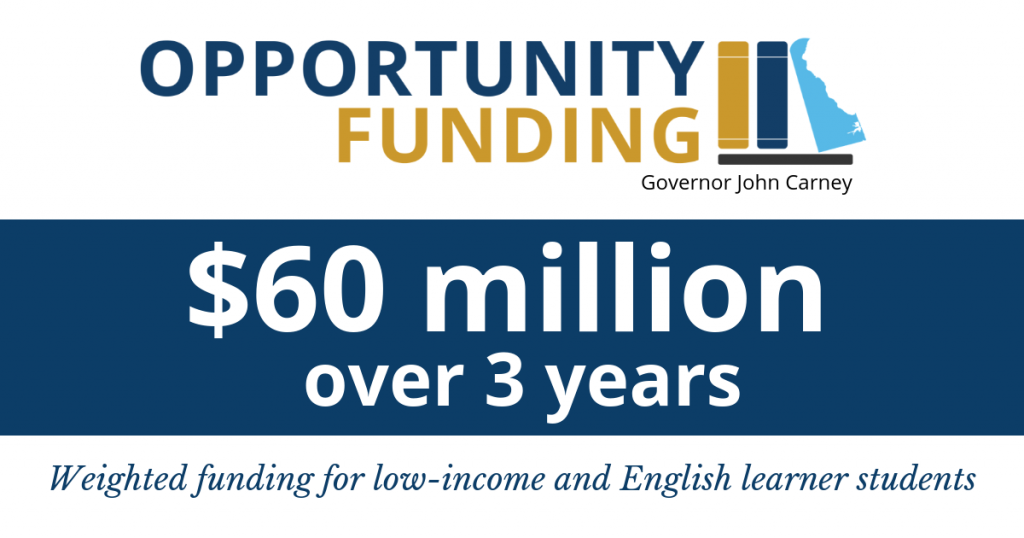
Weighted funding program will target resources for low-income students, English learners
DOVER, Del. – Governor John Carney, Delaware Education Secretary Susan Bunting, and education advocates on Tuesday announced a three-year, $60 million Opportunity Funding initiative to target resources toward Delaware’s most disadvantaged students.
This program, for the first time in Delaware, will provide weighted funding for low-income and English learner students in schools across Delaware. Every Delaware school district and charter will receive a per-pupil appropriation for each English learner and low-income student they educate. Over the next three years, the Delaware Department of Education will work with district, charter and school leaders, community representatives, parents and educators to evaluate how districts and charters are using the funding, and to measure progress of these students.
“Delaware is one of only a handful of states that does not target additional resources for low-income and English learner students – students who we know need additional resources to reach their fullest potential. This Opportunity Funding initiative will change that,” said Governor Carney. “Despite the efforts of committed educators and school leaders, many of these students are not getting the education they deserve. If we expect all Delaware children to have access to a world-class education, this is an issue that we can’t afford to ignore. Every child, regardless of their background, can learn and deserves every opportunity to succeed.”
The program initially will be funded with a mix of ongoing and one-time funding in Governor Carney’s Fiscal Year 2020 budget proposal. The $20 million annually could be used by districts and charters to fund additional reading and math specialists, counselors, trauma-informed training, after-school programming and smaller class sizes, among other potential uses. Spending plans must be approved by the Department of Education, and spending authorized under the initiative must directly benefit low-income and English learner students.
The Department of Education will work with an independent entity to evaluate results under the new initiative, and a separate commission of community leaders, parents and educators will help evaluate the program’s success and spotlight best practices to achieve results for these students.
“As a former superintendent, I can tell you how valued this extra funding will be by our schools. Our English learners and our students from low-income families need more support,” said Secretary Bunting. “We long have been one of only a handful of states that doesn’t give additional funding for these students. Thank you to Governor Carney for making sure that changes today.”
“Today, Governor John Carney took a significant step toward improving how we fund the Delaware public-school students who face the highest hurdles to success in front of them. The Governor’s three-year, $60 million proposal to add support statewide for English learners and low-income students is a signal to all that hoping and waiting for change is not a way forward for our children, and it hasn’t been for nearly three generations,” said Tony Allen, Chairman of the Wilmington Education Improvement Commission and Executive Vice President at Delaware State University. “The core of the Wilmington Education Improvement Commission’s recommendations to the Governor and the General Assembly was a dramatic shift in the current formula for funding schools to one that was equitable, put the resources where the need was greatest and flexible enough to make changes when appropriate. Many challenged this recommendation, but after input from thousands of Delawareans, including decision-makers at every level and parents working to ensure their children receive the best education possible – no one still maintains that the current system is sustainable, appropriate or fair. Governor Carney has heard those voices too, and while this is just the beginning, it is a bold act and in my estimation, desperately needed.”

“All good public policy starts with an objective look at the facts, and the fact is that many of our students who need the most help have, in one way or another, received the least for far too long,” said Senator Elizabeth Lockman. “Today’s announcement is a major step toward fixing that imbalance. Over the next three years, we have a chance to learn what works in order to establish the kind of broad equity and equal opportunity that will guide future investments in education and put Delaware families of all backgrounds ahead for generations to come.”
“A solid education serves as a foundation for children, inspiring and motivating them to reach their full potential. Every child deserves that goal. This education initiative puts dollars exactly where the school districts need them – into the classrooms – and will provide direct assistance and support to high-needs students,” said Representative Nnamdi Chukwuocha. “Thank you Governor Carney for proposing this robust plan, and working to close longstanding education gaps that disadvantaged students disproportionately face.”
“We know that children who are identified as low income or those who don’t speak English as their first language are more likely to have experienced trauma in their young lives or face unique challenges that need special attention from their educators,” said Stephanie Ingram, President of the Delaware State Education Association. “They need time with a teacher or a specialist to help navigate these challenges. And, we finally have a governor who is willing to acknowledge and fund this.”
“Governor John Carney and our elected officials have taken an important and crucial step today to provide direct state funding to English learner and low income students,” said Javier Torrijos, chair of the Delaware Hispanic Commission and the Governor’s Advisory Council on English Learners. “The Governor and Secretary of Education Susan Bunting are committed to equitable education for all its students and we are extremely grateful for their leadership. The Hispanic Commission has been advocating for equity funding for low-income and specifically English learners. This will provide the resources needed to help bridge the gap in education that for so long has been desperately needed. We must continue to look for ways to sustain the funding and effectively use the dollars to provide a quality education to this particular undeserved student population.”
“I’m excited about the funding opportunity that is being proposed by Governor Carney for our English Language Learners and students in poverty. This additional funding is one of the top priorities for the Superintendents this year and I am grateful to the Governor for advocating for our students,” said Heath Chasanov, Superintendent of the Woodbridge School District. “Additionally, I appreciate the flexibility in program design that is being offered with this funding. I believe that allowing districts to make the decisions that best meet the needs of their students, and the communities we serve, will lead to greater success for our students.”
“While Delaware is a small state, each school district still faces unique challenges in meeting the needs of their student population,” said Kevin Fitzgerald, Superintendent of the Caesar Rodney School District. “What students may need in Wilmington may differ from the needs of those in Dover or in Georgetown. The funding opportunity that Governor Carney has proposed recognizes those differences and will provide the resources needed.”
###



















































































